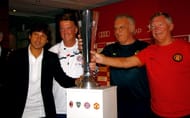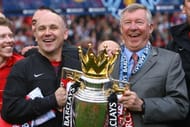
MOSCOW – MAY 21: Manchester United manager Sir Alex Ferguson (R) and assistant Carlos Queiroz hold the trophy after the UEFA Champions League Final match between Manchester United and Chelsea at the Luzhniki Stadium on May 21, 2008 in Moscow, Russia.
Everybody knows the story behind Alex Ferguson’s appointment as the manager of Manchester United, the initial disapproval and derision at his appointment and also the success that followed.
Well, you better.
But not a lot of people are completely aware of the background story of the great man who turns 71 in two and a half weeks. The story of how one of the most maverick, controversial, notorious, and yet beloved – to some, at least – figures of Scottish football was chosen to take over the reins at the club with the most romantic and poignant history in the history of European football. The story of how Alex Ferguson, the young bloke who grew up as the obstinate mule who would score lots of goals for the various clubs he played for in a fascinating playing career, became the man who knocked ‘Liverpool off of their perch’ (Quote censored for quite obvious reasons).
It was on New Year’s eve that Ferguson took birth, as the first child to his parents. He was born to a Protestant father and a Catholic mother (such aspects of a marriage were remarkably rare in Scotland those days) and grew up in Govan, a place where, for the countless men who went to work at the shipyard every morning, happiness was synonymous with survival.
Or at least that’s how Ferguson likes to put it anyway.

MUNICH, GERMANY – JULY 28: Head coach of AC Milan Leonardo, head coach of Bayern Louis van Gaal, head coach of Boca Juniors Alfio Basile and head coach of Manchester United Sir Alex Ferguson attend the press conference during the Audi Cup 2009 at the Westin Hotel on July 28, 2009 in Munich, Germany.
He was brought up in a home with which the word ‘poverty’ would have been unfair to associate, yet so would have been ‘well-to-do’. Ferguson did not grumble about it, though. ‘We never had a lot’, he wrote in his autobiography, ‘but I wouldn’t call it poverty. You always had your meals, you never missed school. You were always clean and tidy’.
Cleanliness, punctuality and discipline were the values instilled in him by Alexander Ferguson, his father, at a tender age. And he found the first two of these qualities easier to imbibe from his old man than the last one, as hundreds of Scottish professional footballers were to discover when they tried knocking Ferguson off the ball in his playing days. Nevertheless, Ferguson displayed a gift and passion for the game, as he and his younger brother Martin would cheerfully take to Ibrox to watch their beloved Rangers play, although their father secretly favoured the green and white hoops of Celtic to the blue of rangers predominant in Govan.
He played football with and for the Life Boys, and later the Boys’ Brigade, to which the Life Boys graduated to. He also played for his secondary school, Govan High, and that his football wasn’t going unnoticed was clear when he was invited to train with the Drumchapel Amateurs, a prestigious footballing academy which holds the distinction of having produced a lot of professional footballers (some more successful than others), including Ferguson and David Moyes.

MANCHESTER, ENGLAND – MAY 16: Manchester United Manager Sir Alex Ferguson (R) and Assistant Mike Phelan celebrate with the Barclays Premier League trophy after their side won the Premier League title at the end of the Barclays Premier League match between Manchester United and Arsenal at Old Trafford on May 16, 2009 in Manchester, England.
After a couple of promising seasons as an amateur at Queen’s Park and St Johnstone, which included a hat-trick at Ibrox, the theatre of his boyhood dreams, he proceeded to turn professional by joining Dunfermline Athletic, and under Willie Cunningham, with whom Ferguson was to have a love-hate and cheerfully foul-mouthed relationship, flourished. He left his trade at the toolmaking factory he worked at, and put all the eggs in his footballing basket. Having spotted Cathy Holding (now Ferguson)in a dance hall, he approached her and they hit it off from the start. With a much needed fillip coming in the form of love, Ferguson resolved make the most of his playing career.
Ferguson was never the player who adroitly slid past two defenders, turned another and finished into the top right corner. Nor was he the one to run fifty yards at blistering pace to recover the ball after losing it in the opposition’s penalty box. Which, quite obviously, was why Ferguson never managed to reach the highest echelons of Scottish football, leave alone elsewhere. But, that hardly implies that he turned out to be a failure in professional football. Despite not being the most gifted or technically sound striker, if there was one thing Ferguson knew to do, loved to do, and did very consistently, it was scoring goals. He scored lots and lots of them for a handful of clubs in his days as a pro footballer, and you can expect to read all about it in the next instalment of this article about the pre-United years of the most successful manager in European football.
